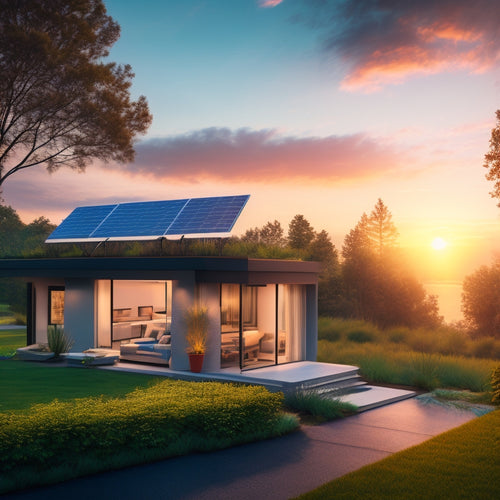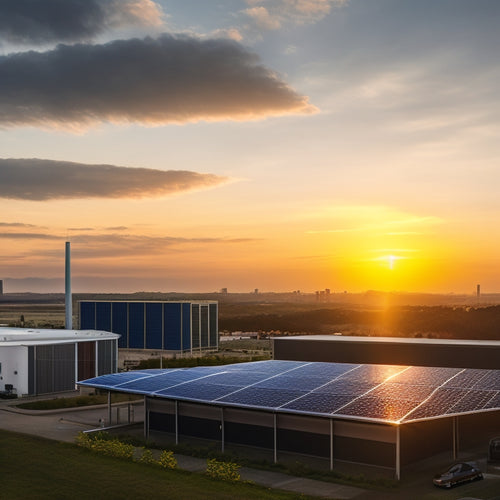
Powering Your Home Water Supply Off-Grid
Share
When powering your home water supply off-grid, you're contemplating a reliable and renewable source of energy. To get started, you'll need to assess your water pump's efficiency, guaranteeing it meets quality standards, and evaluate solar pump types such as DC submersible, AC centrifugal, and DC surface pumps. Next, choose the right solar panels, taking into account efficiency, type, and budget. Accurately sizing your system based on daily water usage and peak power requirements is vital. You'll also want to think about a battery backup system to secure a steady supply during low sunlight or outages. As you begin this process, you'll want to investigate each of these components in more depth to achieve a seamless, self-sufficient water supply.
Overview
- Choose a reliable solar water pump that meets water quality standards, considering factors like flow rate, pressure, and power consumption.
- Select high-efficiency solar panels with a minimum rating of 18% to maximize energy production and reduce fossil fuel reliance.
- Accurately size your solar water system by calculating daily water usage, peak power requirements, and system efficiency to ensure reliability.
- Consider a battery backup system to store excess energy for nighttime use and ensure a steady water supply during low sunlight or outages.
- Properly install and regularly maintain your system, using durable materials and scheduling routine inspections to prevent issues and contamination.
Solar Power for Water Pumps
When you're relying on a well or rainwater harvesting system for your off-grid home, accessing that water can be a challenge, especially if you're not connected to the grid.
Solar power can be a reliable solution to pump water from your well or storage tank to your home. Think about assessing pump efficiency, focusing on flow rate, pressure, and power consumption for peak operation, and verify your pump meets water quality standards, incorporating features for contaminant removal and filtration.
There are several solar pump types to evaluate, including DC submersible pumps, AC centrifugal pumps, and DC surface pumps. Each type has its own advantages and disadvantages, so it's crucial to choose the right one for your specific needs.
Look for energy-efficient pumps with high conversion rates to minimize your energy consumption. A well-designed solar pumping system can provide a consistent water supply while reducing your reliance on fossil fuels.
Choosing the Right Solar Panels
Selecting the ideal solar panel for your off-grid water pumping system is critical to ensuring a reliable and consistent water supply.
You'll want to evaluate panel efficiency, as it directly impacts your system's overall performance. Off-grid solar systems with high-efficiency panels provide reliable renewable energy for remote areas renewable infrastructure.
Look for high-efficiency panels with a minimum rating of 18% to maximize energy production.
Two common solar types to evaluate are monocrystalline and polycrystalline panels. Monocrystalline panels offer higher efficiency rates, but are more expensive. Polycrystalline panels are more affordable, but slightly less efficient.
When choosing between these options, weigh the upfront cost against your energy needs and budget.
Sizing Your Solar Water System
With your high-efficiency solar panels in place, you're now ready to determine the ideal size for your solar water system. To do this, you'll need to calculate your water demand. This involves calculating your daily water usage in gallons, considering factors like household size, appliances, and irrigation needs.
Accurate system sizing is vital, as it directly impacts energy efficiency and reliability, much like farm energy demands which require customized solutions to meet unique farm needs. Evaluating the peak power requirements during critical operations and daily energy usage patterns is fundamental.
Next, you'll need to take into account system efficiency, which includes the efficiency of your solar panels, pump, and plumbing. By factoring in these variables, you can determine the required system size to meet your water demand.
A correctly sized system guarantees you have a reliable water supply while minimizing energy waste. Aim for a system that can produce at least 1.5 to 2 times your daily water demand to allow for variations in sunlight and water usage.
Battery Backup for Water Supply
You've accurately sized your solar water system to meet your daily water demand, but what happens when the sun doesn't shine? A battery backup system guarantees a steady water supply, even on cloudy days or during power outages.
It stores excess energy generated by your solar panels during the day, allowing you to draw water at night or during periods of low sunlight. When selecting a battery backup system, consider energy efficiency and water quality.
Look for deep-cycle batteries designed for off-grid systems, which provide a stable power supply without compromising water quality. A well-designed battery backup system guarantees your water supply remains reliable, efficient, and free from contamination.
Installation and Maintenance Tips
Two essential aspects of guaranteeing your off-grid water supply system runs smoothly are proper installation and regular maintenance.
You'll want to choose piping materials that can withstand harsh weather conditions and resist corrosion. Consider using materials like PEX or PVC for their durability and resistance to scaling.
When installing your filtration systems, verify they're easily accessible for maintenance and replacements. Regularly check and replace filters to prevent clogs and contamination.
Schedule routine inspections to identify potential issues before they become major problems.
Frequently Asked Questions
How Often Should I Inspect My Off-Grid Water Supply System?
You should establish a regular inspection schedule to guarantee your system's reliability, performing checks every 1-3 months to identify potential issues before they become major problems, and annually for a thorough system maintenance.
Can I Use a Wind Turbine to Power My Water Pump?
You might think wind turbines are too intermittent, but they can reliably power your water pump, especially if you pair a consistent wind pattern with a DC-powered submersible or centrifugal pump that utilizes wind energy efficiently.
Are There Any Government Incentives for Off-Grid Water Systems?
You'll find federal grants and state programs offering incentives for off-grid water systems, such as the USDA's Rural Utilities Service and EPA's Water Infrastructure Finance and Innovation Act, which can help you fund your independent water supply.
Can I Use My Off-Grid System for Irrigation and Livestock?
Like a farmer cultivating a lush garden, you're wondering if your off-grid system can quench the thirst of your land and livestock. Yes, you can repurpose your rainwater harvesting setup and solar pumps to irrigate your crops and hydrate your animals, giving you total freedom.
How Do I Handle Freezing Temperatures With My Off-Grid Water System?
When temperatures drop, you'll need to protect your pipes from freezing; make certain you're using proper insulation techniques to prevent frozen pipes, and consider installing freeze-proof valves or heated pipe wraps to keep your water flowing freely.
Ready to Buy
As you flip the switch on your off-grid water supply, the sun's energy courses through your system like lifeblood, quenching your home's thirst for water. With the right solar panels, a properly sized system, and reliable battery backup, you'll enjoy a steady flow of water, even when the grid can't deliver. Your independence from the grid is now a reality, and you're free to savor the sweet taste of self-sufficiency.
Related Posts
-

The Future of Residential Energy Storage
The future of residential energy storage looks promising and cost-effective for you. With lithium-ion battery prices ...
-

Solar Powered Lights for Sustainable Home Decor
Solar-powered lights offer a stylish and eco-friendly way to enhance your home decor. They capture sunlight, converti...
-

Advantages of Commercial Solar Battery On-Site Storage
By investing in a commercial solar battery on-site storage system, you can greatly reduce your energy grid dependence...


